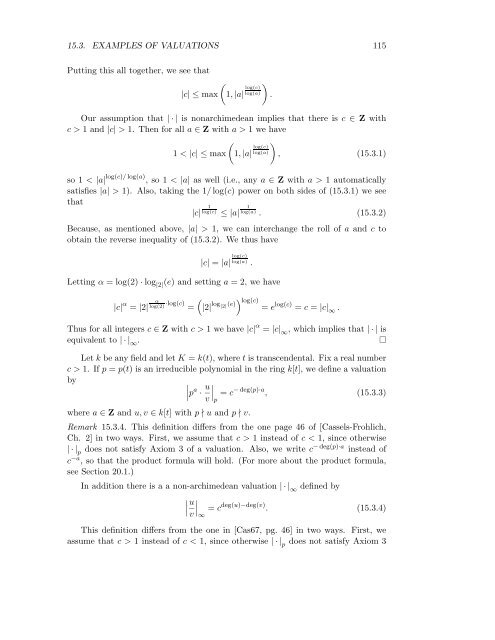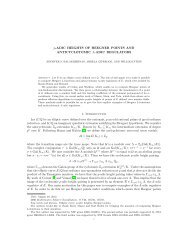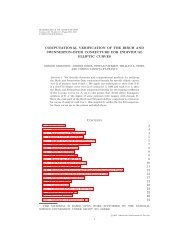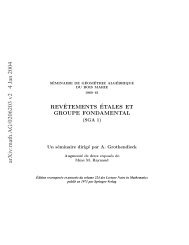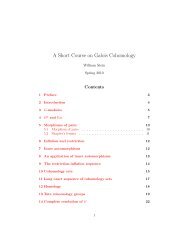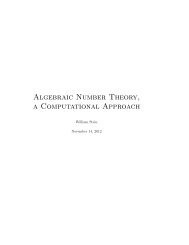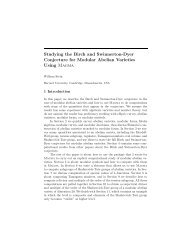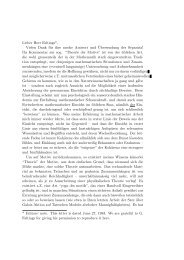A Brief Introduction to Classical and Adelic Algebraic ... - William Stein
A Brief Introduction to Classical and Adelic Algebraic ... - William Stein
A Brief Introduction to Classical and Adelic Algebraic ... - William Stein
You also want an ePaper? Increase the reach of your titles
YUMPU automatically turns print PDFs into web optimized ePapers that Google loves.
15.3. EXAMPLES OF VALUATIONS 115<br />
Putting this all <strong>to</strong>gether, we see that<br />
|c| ≤ max<br />
<br />
1, |a| log(c)<br />
<br />
log(a) .<br />
Our assumption that | · | is nonarchimedean implies that there is c ∈ Z with<br />
c > 1 <strong>and</strong> |c| > 1. Then for all a ∈ Z with a > 1 we have<br />
<br />
1 < |c| ≤ max 1, |a| log(c)<br />
<br />
log(a) , (15.3.1)<br />
so 1 < |a| log(c)/ log(a) , so 1 < |a| as well (i.e., any a ∈ Z with a > 1 au<strong>to</strong>matically<br />
satisfies |a| > 1). Also, taking the 1/ log(c) power on both sides of (15.3.1) we see<br />
that<br />
1 1<br />
|c| log(c) ≤ |a| log(a) . (15.3.2)<br />
Because, as mentioned above, |a| > 1, we can interchange the roll of a <strong>and</strong> c <strong>to</strong><br />
obtain the reverse inequality of (15.3.2). We thus have<br />
|c| = |a| log(c)<br />
log(a) .<br />
Letting α = log(2) · log |2|(e) <strong>and</strong> setting a = 2, we have<br />
|c| α = |2| α<br />
log(2) ·log(c) <br />
= |2| log |2| (e) log(c)<br />
= e log(c) = c = |c| ∞ .<br />
Thus for all integers c ∈ Z with c > 1 we have |c| α = |c| ∞ , which implies that | · | is<br />
equivalent <strong>to</strong> | · | ∞ .<br />
Let k be any field <strong>and</strong> let K = k(t), where t is transcendental. Fix a real number<br />
c > 1. If p = p(t) is an irreducible polynomial in the ring k[t], we define a valuation<br />
by <br />
p a u<br />
<br />
<br />
· = c<br />
v p<br />
−deg(p)·a , (15.3.3)<br />
where a ∈ Z <strong>and</strong> u, v ∈ k[t] with p ∤ u <strong>and</strong> p ∤ v.<br />
Remark 15.3.4. This definition differs from the one page 46 of [Cassels-Frohlich,<br />
Ch. 2] in two ways. First, we assume that c > 1 instead of c < 1, since otherwise<br />
| · | p does not satisfy Axiom 3 of a valuation. Also, we write c − deg(p)·a instead of<br />
c −a , so that the product formula will hold. (For more about the product formula,<br />
see Section 20.1.)<br />
In addition there is a a non-archimedean valuation | · | ∞ defined by<br />
<br />
<br />
u<br />
<br />
<br />
= c<br />
v ∞<br />
deg(u)−deg(v) . (15.3.4)<br />
This definition differs from the one in [Cas67, pg. 46] in two ways. First, we<br />
assume that c > 1 instead of c < 1, since otherwise | · | p does not satisfy Axiom 3


